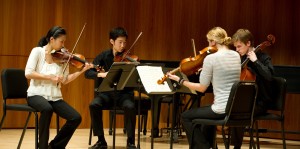 Conservatory Program
Conservatory Program
The AMI Conservatory Program is geared toward serious-minded musicians and is designed to bring young musicians ages 7-18 years old to the next level of their musical education. It combines key elements within music education and performance to develop students ability to prepare for a career or college education in music.
Entrance Audition – TBA
Saturdays – 12pm—4pm
Curriculum:
12-1pm – Music Appreciation
1-2pm – Group Instrument Class (Pedagogy)
2-3pm – Chamber Music
3-4pm – Orchestra / Band / Performance Class
Tuition:
$450 – Pay Tuition Online
Note: Students must have at least 2 or more years playing experience to participate. The program takes place at AMI’s Clarendon Hills Campus.
The conservatory program is an accelerated program for serious-minded young musicians. Acceptance into the AMI Conservatory Program is based on both the merit and commitment level of the applicant.
Audition Specs:
- Audition Date – TBA
- Ages – 7 – 18 years old
- Repertoire – 1 piece/movement – level appropriate (up to 5 min)
- Placement Test – at time of Audition
- Application Deadline – TBA
Why Enroll in our Conservatory Program?
Music Education Boosts Brain Power
Language processing: Several recent studies suggest that the brain processes music and language in similar ways. Training in music may improve language-related skills. In 2005, Researchers at Stanford discovered that mastering a musical instrument improves the way the human brain processes parts of spoken language. Students who have difficulty with language and reading skills could especially benefit from musical training.
Memory: A 2003 study found that children with musical training showed better verbal memory than their peers. Memorizing music pieces correlated with stronger non-musical memory, too.
Math: If you’ve ever tried to read a piece of music, you know that music requires you to preform mathematical processes on the fly. A study by The Royal Conservatory of Music in Canada found that students in their program scored significantly higher on mathematical tests of computation and estimation than did students in a control group.
Self-Awareness: Dr. Frank Wilson, a neurologist and an authority on the relationship of hand use to human cognitive development, explains that the study of music teaches children to “self assess,” rather than to rely on external rewards. Music can foster internal motivation. The precision and attention required to play an instrument — the instant feedback loop that requires you to adjust your own performance — encourages an ongoing surveillance of yourself.
Academic success: With all the benefits that music brings to kids’ language, math, memory and self-assessment, it’s little surprise that there is a strong correlation between music and general academic success. Studies have shown that students in music programs scored higher in English and math than students who had no music at all, and high school students with musical training scored higher than their non-musical peers on the SAT.
Long-term success: Students with music training tend to rank higher in common measures of long-term success such as educational attainment and income: a 2007 poll by Harris Interactive found that nearly nine out of ten people with post-graduate education had participated in music while in school, and 83 percent of those with incomes of $150,000 or more had had music education.
